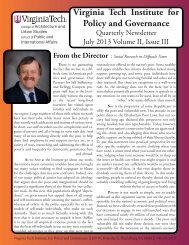1 Towards a Critical Social Theory of Philanthropy in an Era of ...
1 Towards a Critical Social Theory of Philanthropy in an Era of ...
1 Towards a Critical Social Theory of Philanthropy in an Era of ...
You also want an ePaper? Increase the reach of your titles
YUMPU automatically turns print PDFs into web optimized ePapers that Google loves.
Susta<strong>in</strong><strong>in</strong>g co-ord<strong>in</strong>ation <strong>an</strong>d coherence among a wide variety <strong>of</strong> actors with<br />
different purposes <strong>an</strong>d objectives such as political actors <strong>an</strong>d <strong>in</strong>stitutions, corporate<br />
<strong>in</strong>terests, civil society, <strong>an</strong>d tr<strong>an</strong>snational org<strong>an</strong>izations. What previously were<br />
<strong>in</strong>disputably roles <strong>of</strong> government are now <strong>in</strong>creas<strong>in</strong>gly seen as more common,<br />
generic societal problems which c<strong>an</strong> be resolved by political <strong>in</strong>stitutions but also<br />
by other actors. The ma<strong>in</strong> po<strong>in</strong>t here is that political <strong>in</strong>stitutions no longer exercise<br />
a monopoly <strong>of</strong> the orchestration <strong>of</strong> govern<strong>an</strong>ce (4).<br />
In the current era <strong>of</strong> govern<strong>an</strong>ce the focus is now on devolvement <strong>of</strong> what were once considered<br />
government responsibilities to nongovernmental entities. New federalism <strong>an</strong>d devolution have<br />
given way to govern<strong>an</strong>ce <strong>an</strong>d associational democracy (Hirst 2000; Pierre 2000; Rhodes 1994;<br />
Sorenson 2002; see also Stephenson 2006, on the parallels between federalism <strong>an</strong>d govern<strong>an</strong>ce),<br />
<strong>an</strong>d the foundation <strong>of</strong> the welfare state (m<strong>an</strong>datory taxes) is be<strong>in</strong>g dism<strong>an</strong>tled <strong>in</strong> favor <strong>of</strong><br />
voluntary contributions (phil<strong>an</strong>thropy).<br />
Govern<strong>an</strong>ce seems to be the latest focus <strong>in</strong> a long str<strong>in</strong>g <strong>of</strong> debates over the role <strong>of</strong> the<br />
state <strong>in</strong> <strong>an</strong> era that Ernest M<strong>an</strong>del (1972) titled late capitalism. Late capitalism is “not a new<br />
epoch <strong>of</strong> capitalist development. It is merely a further development <strong>of</strong> the imperialist, monopolycapitalist<br />
epoch” (M<strong>an</strong>del 1972, 10). Accord<strong>in</strong>g to M<strong>an</strong>del, the three ma<strong>in</strong> functions <strong>of</strong> the state<br />
<strong>in</strong> late capitalism are the provision <strong>of</strong> the general conditions <strong>of</strong> production, the repression <strong>of</strong><br />
threats to the prevail<strong>in</strong>g mode <strong>of</strong> production from the dom<strong>in</strong>ated classes, <strong>an</strong>d the <strong>in</strong>tegration <strong>of</strong><br />
the dom<strong>in</strong>ated classes <strong>in</strong> order to ensure that they accept their own exploitation (475). This<br />
political dom<strong>in</strong>ation, accord<strong>in</strong>g to M<strong>an</strong>del, is the task <strong>of</strong> centralized state adm<strong>in</strong>istration (482). In<br />
other words, the state exists to ma<strong>in</strong>ta<strong>in</strong> the social structure necessary for capitalism (474-475).<br />
What M<strong>an</strong>del describes as the state apparatus provid<strong>in</strong>g the general-technical <strong>an</strong>d general-social<br />
5






